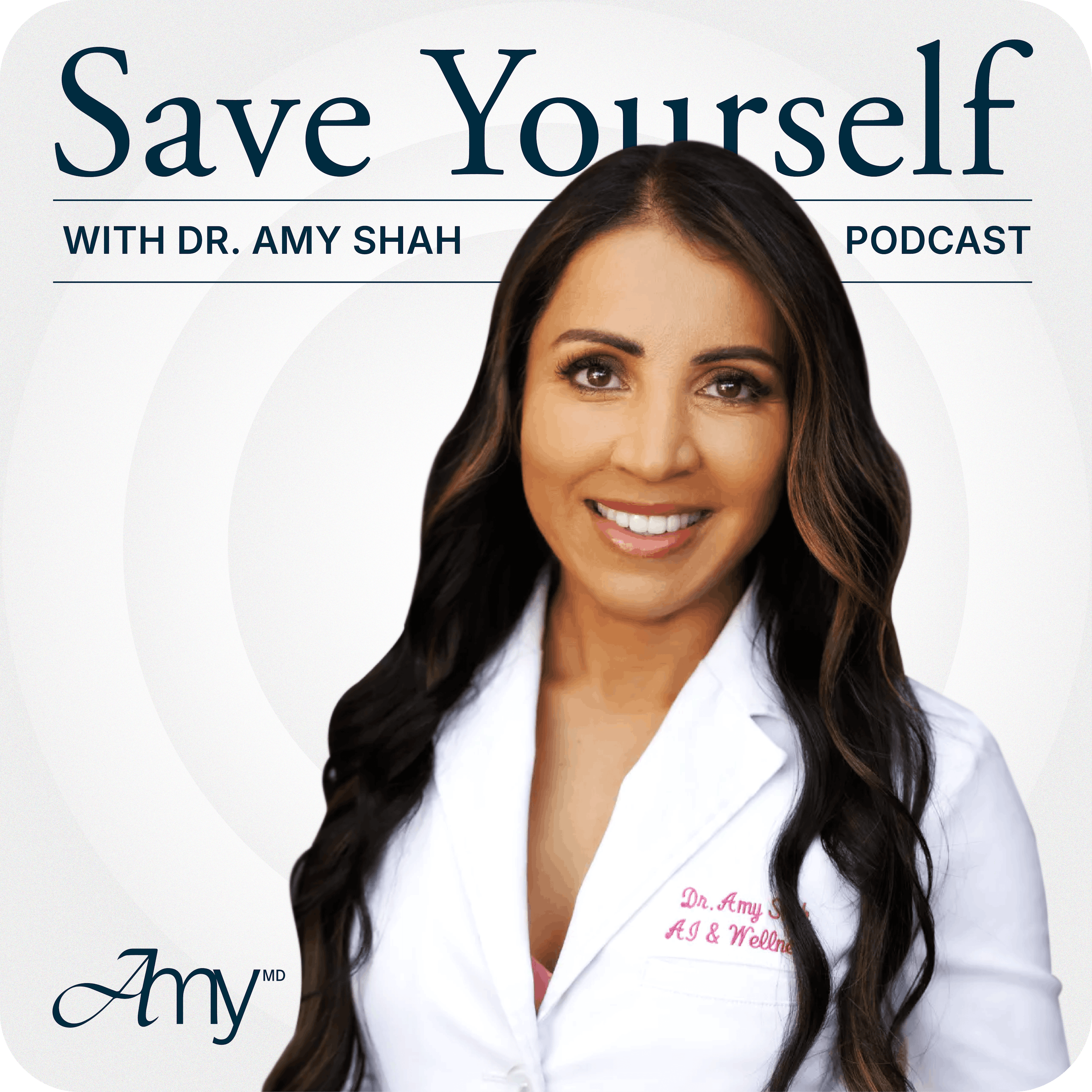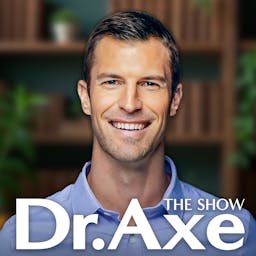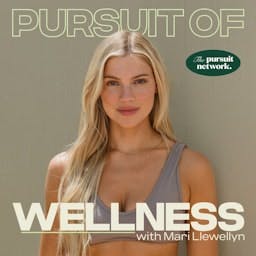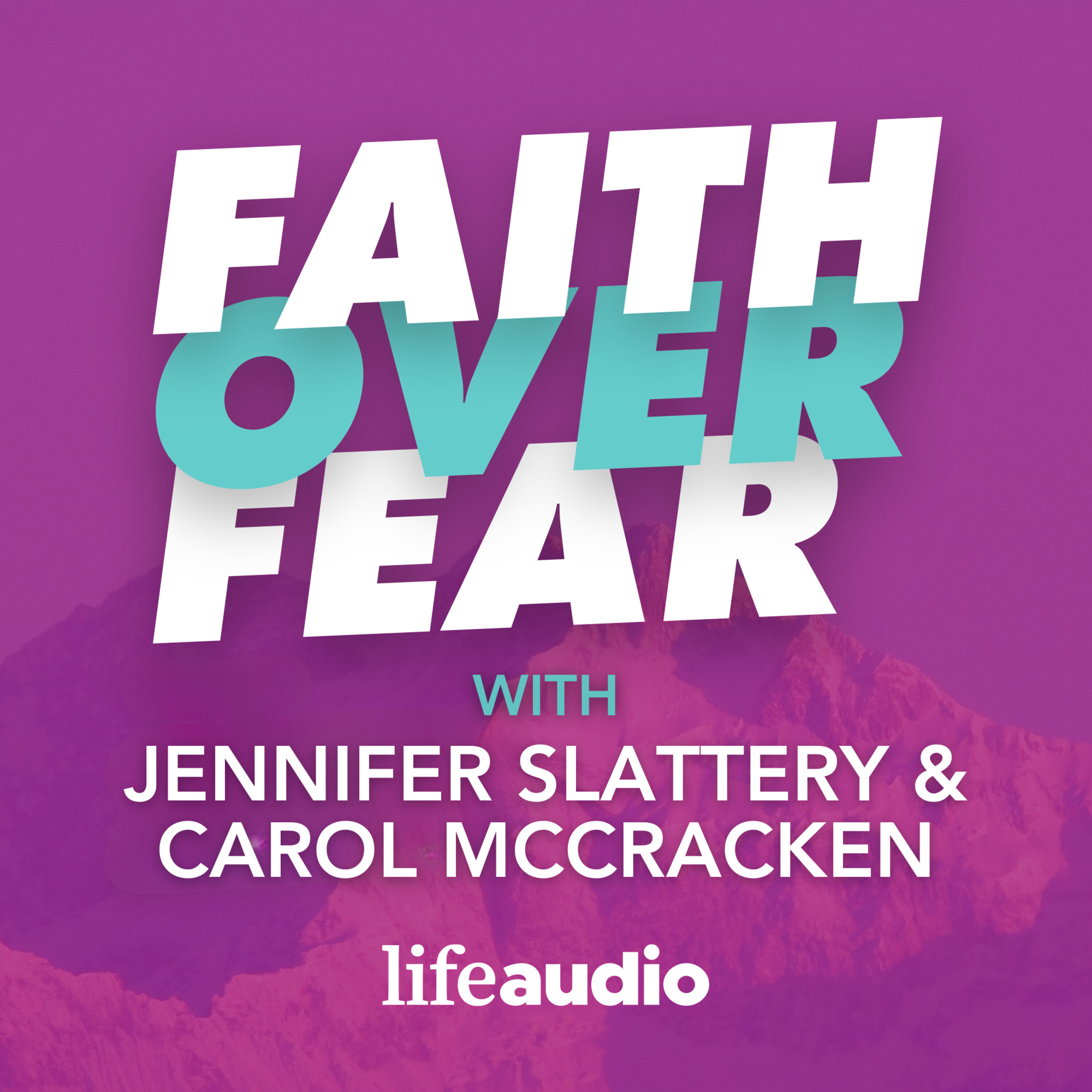.jpg)
Mindfully Integrative Show
Welcome to the Mindfully Integrative Podcast! We are dedicated to featuring inspirational and successful individuals who have embraced mindful investing to achieve optimal integrative wellness. Our podcast dives into all aspects of mindfully incorporating integrative functional health into our lives, aiming to help create a more balanced and fulfilling life. New episodes are released every Friday and cover a wide range of informative and entertaining topics, interviews, and discussions.
We explore a mindful approach to the mind-body connection with guests discussing various topics in integrative holistic health. This includes areas such as whole health, functional medicine, spiritual health, financial health, mental health, lifestyle health, mindset shifts, physical health, digital health, nutrition, gut health, sexual health, body positivity, family health, pet health, business health, and life purpose, among others.
Dr. Damaris G. is an Integrative Doctor of Nursing Practice, a Family Nurse Practitioner, a mom, and a veteran. For collaboration, interviews, or to say hi, you can contact her via email at damaris@mindfullyintegrative.com. You can also find her on LinkedIn at or https://www.linkedin.com/in/damarisdnp/. To join our membership and access resources, visit our website at https://mindfullyintegrative.com .
Please note that the information shared here is for informational and educational purposes only and should not be considered medical advice. Always consult with a physician or other licensed healthcare provider when making healthcare decisions. Enjoy the podcast!
Mindfully Integrative Show
The Evolution of Bodywork and Energetic Healing
Discover the transformative power of integrative health with Lee Ancrum, a distinguished expert with over three decades of experience in bodywork. Lee's fascinating journey began unexpectedly with a friend's interest in a massage class, which ignited her passion for understanding pain patterns and holistic health. Her commitment to learning led her to a comprehensive five-year program at a French osteopathic school in Canada. Lee shares how her love for ballroom dancing, especially the waltz and foxtrot, intertwines with her professional endeavors, enriching her holistic approach to health that considers the interconnectedness of the physical, emotional, and systemic factors in healing.
Explore the evolving art of bodywork as Lee discusses the importance of personalized treatment plans and how practitioners can facilitate innate health and wellness rather than simply 'fixing' clients. Hear about the creation of a functional school inspired by her years of teaching cranial sacral therapy and the significant health transformations she has facilitated, addressing conditions from encephalitis to TMJ. Discover the profound impact of her unique program in Oklahoma and the power of being open to energetic work for healing. Connect with Lee through the Anchor Institute's website, Facebook page, and YouTube channel for more insights and transformative health information.
Sponsor Affiliates
Empowering Your Health
Get YOUR Own
Joburg Protein Snacks
Discount Code: Damaris15 Or Damaris18
Feeling need to Lose Weight & Become metabolically Healthy
GET METABOLIC COURSE GLP 1 REseT
This course is designed for individuals looking to optimize their metabolic health through integrative and functional medicine approaches. Whether you're on a GLP-1 medication or seeking natural ways to enhance your metabolic function, this course provides actionable steps, expert insights, and a personalized roadmap sustainable wellness.
Are you feeling stressed, tired, or Metabolism imbalanced?
Take advantage of our free mindful steps to help improve your well-being.
ENJOY ONE OF our Books
Mindful Ways Health Wealth & Life
https://stan.store/Mindfullyintegrative
Join Yearly membership ALL IN ONE FUNCTION HEALTH
Ask Us for help...
Hi, how are you? This is Dr Damaris Maria Grossman and this is the Mindfully Integrative Show. Today we have an amazing mindful chat with Lee Ancrum. She is 30 plus years in body work, health work and helping herself and other clients, and I can't wait for you to meet her and talk with her today. Thanks so much, lee, for being on. Thank you, I appreciate you having me, I appreciate your time and you know kind of diving into you know things that you'd like to discuss. But first off, I always say a kind of quick fun fact that people don't know about you.
Speaker 2:Well, people don't know Most people don't know that I absolutely love the ballroom dance, all kinds of ballroom dancing.
Speaker 1:And do you ballroom dance like on the regular, like every day, like once a week? Do you like compete too Well?
Speaker 2:I have competed and I ballroom dance. I actually have two two hour lessons a week, and so I dance for four hours every week.
Speaker 1:I love it.
Speaker 2:That's great. I've been dancing about 11 years, yeah 11.
Speaker 1:Oh man, do you wear the outfits too. Like I went to an event and I remember they were as another ballroom dancing event. I think it was like a convent, it must've been a competition and we like snuck in there and like just look at your outfits. I was like this is so neat, I can't dance a lick of mine when I'm like such a bad dancer, but I like just the music and fun.
Speaker 2:It of mine. I mean I'm like such a bad dancer but I like just the music and fun. It is fun, very fun.
Speaker 1:And yes, when I compete I do wear those outfits, sort of fringy kind of colorful, I know, but they're so I'm just impressed with the posture and the way that people you know it's cool, it's very cool. So what's? Oh? My next part of that is what's your favorite dance? Oh?
Speaker 2:you know, I used to think that my favorite dance was doing like a salsa or something. But once I started studying, um, really working with the waltz and the foxtrot, oh my god, I love those dances. They are so much fun. They really, really are. So I always thought that I, you know, I wanted to do all the Latins, which I do do, but I and I do them all comparably. But I really love Walson Fox a lot.
Speaker 1:That's cool. I, oh my God, I'm telling you I think I feel like I have two left feet so I wouldn't even be able to like. I'm like, okay, a box. That's about the most you got out of me, so let's get into kind of a little bit about yourself. So how is I know? I call this integrated health space, whole space. You're in body work. What got you into?
Speaker 2:that. What got you into kind of that work and that line of work. Well, you know, the funny thing is I kind of make the joke because I get asked how did I get into this? A lot and each of my, I have this functional school of body work and you know, at the beginning of the school I always talk about. You know, I have everybody talk about themselves. I talk about myself.
Speaker 1:Yeah, and.
Speaker 2:I always make this kind of joke that says it's not. I didn't get in from an altruistic sort of standpoint. Is that sort of like? This guy and I followed his lead. He wanted to take a massage class, but it was something so much bigger than that leading me to it. You know, something led me to this and once I became a massage therapist I went to a small class and then I became a massage therapist.
Speaker 2:I still wasn't clear that this was my path, but what I kept doing, and what I hope people will do for themselves in whatever their path is, is to say yes.
Speaker 2:So I went and began to do after I graduated from massage school this was in 1987, I began to take other classes and study about pain, pain patterns and how to help people in that way, and I just kind of kept saying yes. And then people kept telling me about more classes, and so I was educating myself hard on for many, many years. But at one point, probably after I graduated from massage school it was about three or four months later I went leap, do it, trust that you can do this for your living and your life. And I did and, oh my gosh, it's been the most amazing 35 year journey. It has been an amazing journey for me and I kept studying higher and deeper and deeper levels until I finally, after I was a massage therapist for 15, 16 years I had studied rolfing and lymphatic work and all these different facets of health and work I actually went and became studied at a French osteopathic school in Canada and it was a five-year program.
Speaker 2:So I was commuting up to Canada to do this.
Speaker 1:You did five years of osteopath medicine, so you're really Dr Lee Ancrum? Well, not really.
Speaker 2:I mean, I can't call myself, but you know in the body work world.
Speaker 1:I mean, doctorate is about extensive studies, so you don't have to have a doctorate, it depends. So I would say yeah, yeah, definitely.
Speaker 2:So I did that and that changed everything. You know, your whole integrative mindset is so right on and so amazing. Because and I was just talking to a client about this how can you pluck something out and only look at something out of context without looking at the whole picture of how something works and how it integrates and how the systems of ourselves, whether it's emotional, whether it's organ, whether it's lymphatic, whether it's anxiety, whatever it is and how all of that all works together? How can I pluck that out?
Speaker 2:I mean if we get to the point where, of course, I'm talking about PTSD and all of that, you know, that affects those kinds of things. Any of those kind of things are affecting every system of the body and people don't seem to understand that. So the sad part about regular medicine is we're looking in isolated things and I'm so grateful that my that my education started to go from isolated to starting to open and back up. You know, you know what I mean, don't?
Speaker 1:you? Oh, I absolutely do. I wouldn't have started this podcast if I didn't. Between the podcast and, and you know, working on my own health health journey. It would have never come to fruition if I hadn't. Yeah, I completely agree.
Speaker 2:And you even started your own and we'll go into that your functional bodywork school, because of your need and passion for change and I've been teaching at smaller levels with smaller amounts of time you know, teaching one week class or weekend class and I did that for years and years. So I've been teaching well over 30 years probably 33 years, something like that and but in 2016, I opened a full fledged licensed school here in Oklahoma, which we can talk about later, but I did that. It was like this program how to do a functional, holistic, integrative program came out of me in 2016.
Speaker 1:It's like a whole new baby right there. Probably you have kids, right? No, I don't. Oh, it's like like a child. Then I would say that's a whole it's a process there. Well, congratulations on that and love to chat um with that further um. So when you were doing and going through this massage work, do you also get massage work too, because I ask a lot of massage I was wondering do you get body work done?
Speaker 2:You know, when I first was a massage therapist, I got massage all the time, all the time, all the time for years. And when I started to go into having higher levels of body work, studying it myself, then my body didn't crave massage anymore. It craves something more sophisticated, that's working with how the body really works. And so I have to say that in the last with so I have my students and my graduates, um, my students who are further along, uh, work on me. So I get work from my graduates, from from my students, but the work is so more on the energetic side right and the spiritual side.
Speaker 1:You take it to another level, beyond the consciousness.
Speaker 2:Way, way so awesome. You know cause I'm not teaching? I'm definitely not teaching how to do massage in my school.
Speaker 1:No, I bet you aren't. I bet you are not.
Speaker 2:That's not what's happening.
Speaker 1:So I don't.
Speaker 2:I do get body work, but I get it a little more haphazardly than I used to in the beginning. In the beginning it's like oh yeah, I want to be massaged all the time, all the time, and that kind of shifted out as I grew in my own sophistication in the work and stuff.
Speaker 1:And that shows the expansion. You know I can understand where you're coming from on that end to see what there's beyond. How have you felt? I mean, obviously you've evolved through the years, you know, and then now you not only have clients but you have students. What's the most profound techniques or things that you like to talk to your clients or your students about?
Speaker 2:You know, one of the things that I do with my that I teach really big is that I start off my training, which is a little over two years long. I start my training with the principles of how a body works. So so there are principles that we truly, truly how we function on these principles. And but one of the things that I teach the students is that and then I say it to them and then I go about trying to teach them how to learn this is that, here's the deal. The treatment plan is in the body. So I don't have like, oh, here's my favorite technique, although, you know, cranial, sacral is part of the training and there's a bit of lymphatics, there's a bit of, you know, there's muscle energy, which is a technique, a certain kind of technique putting joints back together with muscle and different things like that. But how do I know what's right for you? Your body has to tell me. You know, based upon the symptoms that you tell me, what I perceive when I look at you, what I perceive when I watch you walk and what I also get perceptively when I touch you. So all of those things marry together your history, your symptoms, all of those marry together for your system, your body, to tell me, or any of the practitioners from my school, what is the treatment plan, what is the place I'm supposed to start to come in to help you with what's going on.
Speaker 2:You know, and here's the other thing I'm really big on is that we, as practitioners, never fix anybody. It's not about fixing. It's always about helping the innate health and wellness in the person to come out and help them. It's always about connecting to that innate place that exists within all of us to help you back to health. So how can I, ego wise, say that I fix anybody? So it's not that. So, within that dynamic, of course, I'm looking at the treatment plan that's in you. So yours is, is yours is particular to you. So there, isn't any.
Speaker 1:Yeah, no, I, I, I think that the personalized approach and and looking at each one is different is important, because, and then I just I think that the personalized approach and looking that each one is different is important because, and then I just I think it's really an also element that you're saying there is each person needs to empower themselves or teach them their innate nature of understanding their body. Um, that can be probably pretty the amount of emotions that may come up for those individuals when they're trying to learn about themselves. I mean, you're an additional therapist, but not a therapist, you know, right, right.
Speaker 2:Well, I oftentimes send people to therapists often, and then oftentimes you also see the people that don't want to do that, aren't willing to be to actually take that self-responsibility, because that is what there. That is what a therapeutic relationship is. It's not. The therapeutic relationship is not I do to you and then that's done. It's. The therapeutic relationship is we are coming together, working in relationship to help you know, to help you. So I hear you.
Speaker 1:Yeah, no, I definitely am in agreement with your work and it sounds amazing. I love for you to chat with me about your functional school and, first off, you said you started it 2016?. With me about your functional school and, first off, you said you started it 2016? Did Okay, and what inspired you to get to that point Like and you know, to say, hey, you know what I need to birth this beautiful school and do more than just where I'm at.
Speaker 2:That's a great question. Well, for many, many years I've been doing cranial sacral training, cranial sacral therapy, training and teaching, and I've assisted, like different programs, in different parts even of the world. So I've assisted in, you know, England and you know I taught in Italy and assisted in other places Canada, jamaica, all sorts of places and so I was doing cranial trainings here in Tulsa. That would be that met every other month for a weekend and stuff like this. And then it happened that, you know, I kind of got asked to actually okay, so I'll be really honest with you. The truth was is that the state of Oklahoma came to me and said we need you to become licensed, and that was like one of those once again spirit deals, just like this guy who comes and says you know, you have to get licensed. And so when I had to get licensed, I had to put together a program for licensure, right, and this was born.
Speaker 1:And that's awesome. It's supposed to be. That's the. That's like you said. Someone told you it needed to be done.
Speaker 2:It needed to be done. Even though it kind of looked like it needed to be done from the law side of things, it really turned into this amazing thing.
Speaker 1:But now it like see how many people that you're impacting in between the education and then the clients that they're impacting in the ripple effect that you're, you know, cause one conversation or one message that you give to your student or to your client, then that probably can make so much change in individuals and then they're just their perspective is different. I mean you being on this podcast, I'm hoping that someone can listen and say, oh, wow, like there's more to you know my body than just what can I do for this pain? Or what can I do for, like, what is an area? I mean, like you're saying each person is different, but you know why does someone come to you? You know, you know I. I mean like you're saying each person is different, but you know why does someone come to you? You know, you know I. I think there's probably plenty, but you probably have a few answers for that. Oh, I've got dozens of answers.
Speaker 2:You know, of course, there's always that underlying piece around. You know, on the surface, somebody wants to be better. So the superficial part of somebody wants to be better so the superficial part of somebody wants to be better.
Speaker 2:And then there are those people that are coming that they don't it's unconscious want to get better on the deeper, kind of more connected layer. But I am sent anything from people with um, like I just had someone with um encephitis, which is inflammation of the brain. I had someone whose body would start with a pain on one side of her face and then create numbness through her entire body. I have people that come to me for low back pain. I have somebody who's come to me a recent person who came to me that their blood pressure is doing very weird things and jumping back and forth. I have lots. I do a lot. Could be ear infections, could be hyperactivity, could be TMJ, somebody with TMJ. So the range for me there is no end on the range. You know what I'm saying yeah, no, no.
Speaker 1:I find that pretty profound. I know for myself and my own health issues. I literally had, for my TBI, had a like half my body. I had to learn, relearn and I remember needing that energetic work and not believing it at first. I'm like, and when it works, it really works it does, especially if you're open to it. You're if you're open to this you're open. It took a little while. It took a little while, but a couple years there but yeah, you know. I'm glad you're better.
Speaker 2:I'm so glad that it worked for you and that you're open. Took a little while. Took a little while, but a couple years there. But yeah, you know, no, I'm glad you're better.
Speaker 1:I'm so glad that it worked for you and that you're better. Um, I mean, I didn't necessarily get to your phase of what you're doing, but I'm saying I, I have an understanding of probably your work. I don't right, I didn't work with you directly but I'm was you know, I'm. I can imagine how much profound work you're doing for individuals and how many people that you're helping.
Speaker 2:Well, I have to say, Maris, it sounded like you, it sounds like you worked with somebody. Wonderful too, because you're sitting here, you're in this consciousness. So no, I mean that's great.
Speaker 1:It's really great. I think everything is a process that can wait till, and, as I talk to people about it, I think everything is a it's not linear, right?
Speaker 2:No, it's not, no, it's not.
Speaker 1:No, it's not. It's definitely not linear. I would love for you to talk more about how people can reach you and anything that's upcoming um, oh, fabulous, okay, so people can reach us.
Speaker 2:I have a website at it's anchorminstitutecom. I'll have them in the show notes also. Oh, great, great, and it's anchor, so it's anchorminstitutecom. And then I also let me say this is that not only do we have a facebook page at the same address, and we have a youtube channel that has all sorts of little videos talking to me, with me, talking about things that go on in your body, like what are the, what are the symptoms of having liver congestion and what are the symptoms in the body.
Speaker 2:So there's lots of videos of different lengths of time. Some are a a couple of minutes, some are 10 minutes, some are an hour. But we have this whole YouTube channel at Anchor Institute as well. So they can get on the Facebook page. They can do that. They can also email us through the Facebook. I'm sorry, they can email us through my website. Sure, both, for you know I don't love to have people who are looking for an appointment come to the website, but if that's what they need to do, that's totally fine and we'll just get them to the right place.
Speaker 1:Yeah, because not only do I work them as needed.
Speaker 2:But we, yes, we'll direct them as needed, but but the big thing we have, yay is most, um is most. For my school, the School of Functional Body Work, is a two-year, two-month program. We meet, the class meets four days every other month. So they meet January, march, march. So it isn't that they meet every month, it's four days every other month.
Speaker 2:Okay, and we begin the first module.
Speaker 2:Of course, we begin, as I said, by learning the principles of the body how does the body really function and work and how does it work together?
Speaker 2:And then we start working our way, each module built on the next one, and we start working our way through the body from we screw feet and ankles and knees, but we teach it in a way that's like, blow your mind, like seriously, like how the non-weight bearing bone of your lower leg has to do with your lymphatic system.
Speaker 2:How does that have to do with my immune system. So there's ways in which I'm teaching that really are very open and wide in what it is that I'm teaching. And then we work our way through the body and when we get to the neck, after we get to the neck module which this is all on the website I begin to teach organs. So I teach liver and stomach and intestines and pancreas and lungs and heart. And why do I do that as part of my training is because a huge percent somewhere between 65 and 85% of the pain that you feel in your body is coming from an organ. So because that percentage is so high, how can I not give you that system to work when you're trying to help somebody back to health?
Speaker 2:So that in every one of my 14 modules, craniosacral therapy is also part of the module, so you learn about that body part and then you actually learn about, you get, get to do more cranial cycles. So it's two years and two months and it is. You know all about how the interrelationships are going on. Now let me also say that I start mostly one training a year, so that we have, because right now we have two trainings going and I'm going to start, weirdly enough, here.
Speaker 2:It is whatever the date is here, but I have a class that's starting October 6th of this year. So it's four days, it's Thursday through Sunday and I have a class starting October 6th this year and we actually have two slots left. That's all we've got left open on this class that's starting, and then next year the class will start in April, but that's also on our website. So the new training, the training group that starts next year, starts in April. So those are the big things that I have going on is the beginnings of these two trainings, you know as we, as we move along.
Speaker 1:That's wonderful. That's um. I can't wait for you know people, to learn more about you and to like at least check out your YouTube channel. I'll put them in your show notes, I um. Is there another thought that you'd like to leave the audience before you go?
Speaker 2:Let me leave with this thought is and I mean this thank you to you for doing this and for being on a show like this that's sharing new ideas and new thoughts and new ways of looking at things. So, really, kudos to you for being someone who sits and who really does this and communicates and opens other people's eyes. I really want to say thank you to you for doing stuff like that. Oh no, I really.
Speaker 1:I appreciate you being on. I mean, this is like a part of the equation, right, and you know people need to learn more about individuals like yourself. So the conversation needs to come up, because health is not a one one size fits all.
Speaker 2:So I thank you Right. One thing I will just put a little plug in for myself is oh, absolutely Come from all over the country to come to my school. So I just want to say that it's not just about people who live in Tulsa, Oklahoma.
Speaker 1:It's an online school, correct, or people come in person.
Speaker 2:People come in person, or is it online In person? In person? I'm not a huge online teaching kind of person. Anyway, that's just me.
Speaker 1:Well, you could also do an online component of this. I mean not the full school, but you know, at some point. Good thought, yeah, um, but yes, I can't wait for those to reach you, if not, um, thank you so much, and and uh, I really am glad you've been on. Thank you so much.
Speaker 2:I really appreciate it all.
Speaker 1:So thank you guys for listening in and make sure you find a mindful way each and every day.
Podcasts we love
Check out these other fine podcasts recommended by us, not an algorithm.

The Dr. Hyman Show
Dr. Mark Hyman
Functional Fertility with Dr. Kalea Wattles
Kalea Wattles
On Health for Women
Aviva Romm
Save Yourself With Dr. Amy Shah
Dr. Amy Shah
Huberman Lab
Scicomm Media
The Peter Attia Drive
Peter Attia, MD
The Metabolic Classroom with Dr. Ben Bikman
Insulin IQ
FoundMyFitness
Rhonda Patrick, Ph.D.
Change Your Brain Every Day
Dr Daniel & Tana Amen
The Dr. Josh Axe Show
Dr. Josh Axe
Pursuit of Wellness
Mari Llewellyn & Pursuit Network
Feel Better, Live More with Dr Rangan Chatterjee
Dr Rangan Chatterjee: GP & Author
The Level Up Podcast w/ Paul Alex
Paul Alex Espinoza
Faith Over Fear
Jennifer Slattery, Faith Over Fear Author and Speaker
